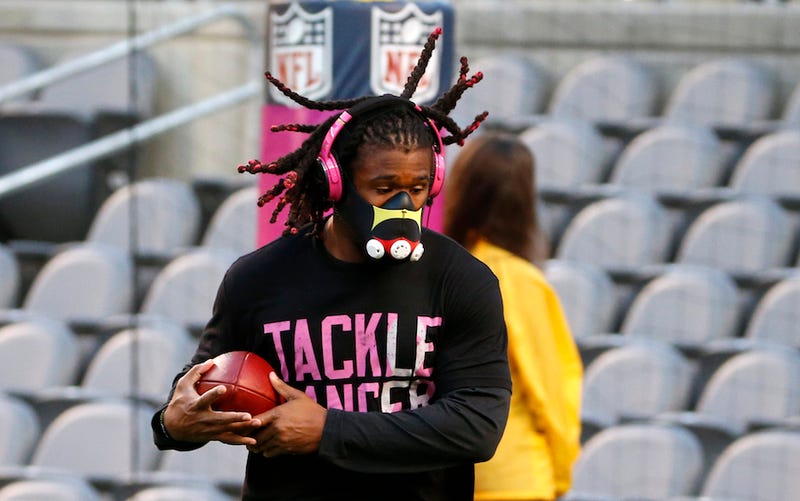
Pittsburgh Steelers running back DeAngelo Williams has an incredibly personal connection to the cause of breast cancer awareness. Four of his aunts died of breast cancer, and last year, so did his mother, Sandra Hill. Williams has dyed his hair pink, painted his toenails, and written about his family’s history of breast cancer, all to draw attention to the cause. The NFL supports him in these efforts—but only to the extent that they get something out of it.
October is Breast Cancer Awareness Month, and the NFL pushes hard, making pink accessories available to players and coaches and putting plenty of pink apparel on sale for fans to buy. They auction game-worn pink apparel, balls, and even coins, all themed for the month. Williams starred in a new commercial for the league this month. The 30-second spot lets you know that “football is family.” Williams proudly shared his appearance:
[ame]https://twitter.com/DeAngeloRB/status/653221813690863617[/ame]
During Monday night’s Steelers-Chargers game, ESPN’s Lisa Salters reported that Williams asked the league if he could wear pink for the entire season, not just October, and that his request was denied. The transcription, via CBS Sports:
As you know, DeAngelo Williams lost his mother to breast cancer last year. He said he went to the NFL earlier this season and asked if there was a way that he could wear pink throughout the season, not just in the month of October. He wasn’t able to do that, but what he did do is, he decided to streak his hair pink. He said breast cancer awareness is not just about October for me, it’s not just a month, it’s a lifestyle. It’s about getting women to recognize to get tested.
There are many, many examples of the NFL championing causes precisely to the extent that it helps make them look compassionate and socially aware, especially when those causes involve women. The rejection of Williams seems unique, though, in how callous it is. The NFL—the Stasi of socks, the regulators of pelvic thrusts—won’t allow its uniform policies to be bent even for a profoundly uncontroversial cause that it claims to support.
The league rulebook has an article for personal messages:
Throughout the period on game-day that a player is visible to the stadium and television audience (including in pregame warm-ups, in the bench area, and during postgame interviews in the locker room or on the field), players are prohibited from wearing, displaying, or otherwise conveying personal messages either in writing or illustration, unless such message has been approved in advance by the League office. Items to celebrate anniversaries or memorable events, or to honor or commemorate individuals, such as helmet decals, and arm bands and jersey patches on players’ uniforms, are prohibited unless approved in advance by the League office. All such items must relate to team or League events or personages. The League will not grant permission for any club or player to wear, display, or otherwise convey messages, through helmet decals, arm bands, jersey patches, or other items affixed to game uniforms or equipment, which relate to political activities or causes, other non-football events, causes or campaigns, or charitable causes or campaigns. Further, such armbands and jersey patches must be modest in size, tasteful, noncommercial, and non-controversial; must not be worn for more than one football season; and if approved for use by a specific team, must not be worn by players on other teams in the League.
If the article prohibits causes not approved by the NFL, but Williams’s request involves a cause explicitly supported by the NFL, you might ask what exactly the problem is. This isn’t “Close Gitmo” on a mouthguard, after all. There aren’t two sides to the issue of breast cancer. No one could conceivably have any qualms with Williams wearing pink outside of October.
To ask what the problem is is to ask a rhetorical question, of course. What’s compromised by DeAngelo Williams wearing pink all season is the NFL’s authority, and its ability to promote its attention to causes at the times and in the places and in the ways it chooses. For a player to color outside those lines can’t be tolerated. It would set a precedent. It would be a sign of weakness. That player should, however, feel free to help promote NFL-approved campaigns in an NFL-approved way that makes the NFL look good.
Teams pursue a similar approach. The Carolina Panthers, Williams’s former team, brought Sandra Hill out before games in past Octobers, making her part of pregame ceremonies. When she died, though, the only person in the organization to attend her funeral was defensive end Greg Hardy.
The NFL cares about the causes you care about, so far as its caring works to promote its brand. The NFL will let you talk about your dead mother in its commercial; it will not let you wear a piece of clothing to remember her outside of a prescribed 31-day period. The NFL deserves anything anyone says about it.
The NFL Will Exploit Your Dead Mom But Not Let You Celebrate Her
------------
I recently hated on Greg Hardy but I take that back.

